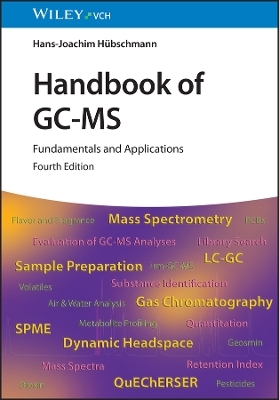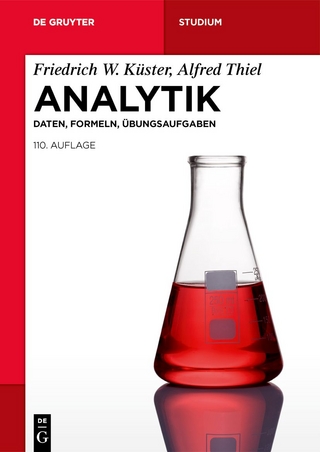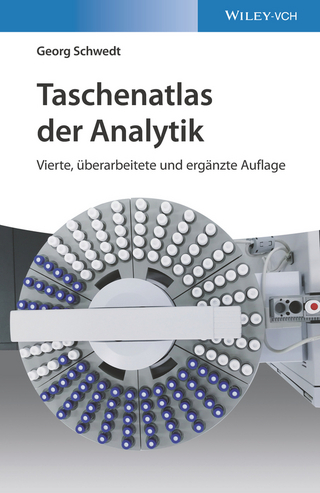
Handbook of GC-MS
Wiley-VCH (Verlag)
978-3-527-35403-0 (ISBN)
- Noch nicht erschienen (ca. April 2025)
- Versandkostenfrei innerhalb Deutschlands
- Auch auf Rechnung
- Verfügbarkeit in der Filiale vor Ort prüfen
- Artikel merken
Table of contents
1 Introduction
1.1 The Historical Development of the GC-MS Technique
2 Fundamentals
2.1 Sample Preparation
Solid Phase Extraction
Dispersive Solid Phase Extraction
Micro Solid Phase Extraction
Solid Phase Microextraction
Pressurized Liquid Extraction
In-Cell Sample Preparation
In-Cell Moisture Removal
In-Cell Hydrocarbon Oxidation
Headspace Techniques
Static Headspace Technique
Dynamic Headspace Technique (Purge and Trap)
Coupling of Purge and Trap with GC-MS Systems
Headspace versus Purge and Trap
Adsorptive Enrichment and Thermal Desorption
Sample Collection
Calibration
Desorption
Pyrolysis
Foil Pyrolysis
Curie Point Pyrolysis
Micro-furnace Pyrolysis
Thermal Extraction (Outgassing)
QuEChERS Sample Preparation
2.2 Gas Chromatography
Sample Inlet Systems
Carrier Gas Regulation
Forward Pressure Regulation
Back Pressure Regulation
Carrier Gas Saving
Injection Port Septa
Septum Purge
The MicroSeal Septum
Injection Port Liner
Split Injection
Splitless Injection
Liner Activity and Deactivation
Liner Geometry
Vaporizing Sample Injection Techniques
Hot Needle Thermo Spray Injection Technique
Cold Needle Liquid Band Injection Technique
Filled Needle Injections
Split Injection
Splitless Injection (Total Sample Transfer)
Concurrent Solvent Recondensation
Concurrent Backflush
Temperature Programmable Injection Systems
The PTV Cold Injection System
The PTV Injection Procedures
The Multimode Injector
Cryofocussing
PTV Cryo-Enrichment
Non-Vaporizing injection Techniques
On-Column Injection update
PTV On-Column Injection
LC-GC Liquid transfer
Capillary Column Choice and Separation Optimization
Choice of Carrier Gas
Sample Capacity
Internal Diameter
Film Thickness
Column Length
Setting the Carrier Gas Flow
Properties of Column Phases
Properties of Ionic Liquid Phases
Chromatography Parameters
The Chromatogram and Its Meaning
Capacity Factor k'
Chromatographic Resolution
Factors Affecting the Resolution
Maximum Sample Capacity
Peak Symmetry
Optimization of Carrier Gas Flow
Effect of Oven Temperature Ramp Rate
Fast Gas Chromatography Solutions
Fast Chromatography
Ultra-Fast Chromatography
Multi-Dimensional Gas Chromatography
Heart Cutting
Comprehensive GC - GC×GC
Modulation
Detection
Data Handling
Moving Capillary Stream Switching
Classical Detectors for GC-MS Systems
Flame-Ionization Detector (FID)
Nitrogen-Phosphorous Detector (NPD)
Electron Capture Detector (ECD)
Photo Ionization Detector (PID)
Electrolytical Conductivity Detector (ELCD)
Flamephotometric Detector (FPD)
Pulsed Discharge Detector (PDD) u
Olfactometry
Classical Detectors Parallel to the Mass Spectrometer re
Microchannel Devices
2.3 Mass Spectrometry
Ionization Processes
Reading Mass Spectra
Electron Ionization
Chemical Ionization
Resolution Power
Resolving Power and Resolution in Mass Spectrometry
Unit Mass Resolution
High Mass Resolution
The Orbitrap Analyser
High and Low Mass Resolution in the Case of Dioxin Analysis
Time-of-Flight Analyser
Ion Mobility
Isotope Ratio Monitoring GC-MS
The Principles of Isotope Ratio Monitoring
Notations in irm-GC-MS
Isotopic Fractionation
irm-GC-MS Technology
The Open Split Interface
Compound Specific Isotope Analysis
On-Line Combustion for d 13C and d 15N Detrmination
The Oxidation Reactor
The Reduction Reactor
Water Removal
The Liquid Nitrogen Trap
On-Line High Temperature Conversion for d 2H and d 18O Determination
Mass Spectrometer for Isotope Ratio Analysis
Injection of Reference Gases
Isotope Reference Materials
Acquisition Techniques in GC-MS
Detection of the Complete Mass Spectrum (Full Scan)
Recording Individual Masses (SIM/MID)
High Resolution Accurate Mass MID Data Acquisition
MS/MS ? Tandem Mass Spectrometry
Mass Calibration
Vacuum Systems
References
3 Evaluation of GC-MS Analyses
3.1 Display of Chromatograms
Total Ion Current Chromatograms
Mass Chromatograms
3.2 Substance Identification
Extraction of Mass Spectra
Manual Spectrum Subtraction
Deconvolution of Mass Spectra
The Retention Index
Libraries of Mass Spectra
Universal Mass Spectral Libraries
Application Libraries of Mass Spectra
Library Search Programs
The NIST Search Procedure
Interpretation of Mass Spectra
Isotope Patterns
Fragmentation and Rearrangement Reactions
DMOX Derivatives for Location of Double Bond Positions
Mass Spectroscopic Features of Selected Substance Classes
Volatile Halogenated Hydrocarbons
Benzene/Toluene/Ethylbenzene/Xylenes (BTEX, Alkylaromatics)
Polyaromatic Hydrocarbons (PAHs)
Phenols
Pesticides
Polychlorinated Biphenyls (PCBs)
Polychlorinated Dioxins/Furans (PCDDs/PCDFs)
Drugs
Explosives
ChemicalWarfare Agents
Brominated Flame Retardants (BFR)
3.3 Quantitation
Acquisition Rate
Decision Limit
Limit of Detection
Limit of Quantitation
Sensitivity
The Calibration Function
Quantitation and Standardization
External Standardization
Internal Standardization
The Standard Addition Procedure
The Accuracy of Analytical Data
3.4 Frequently Occurring Impurities
References
4 Applications
Air Analysis According to EPA Method TO-14
BTEX in Surface Water as of EPA Method 8260
Static Headspace Analysis of Volatile Priority Pollutants
MAGIC 60 -Analysis of Volatile Organic Compounds
irm-GC-MS of Volatile Organic Compounds Using Purge and Trap Extraction
Flavour Identification
Organotin Compounds in Water
Multi-Method for Pesticides by Single Quadrupole MS
Analysis of Dithiocarbamate Pesticides
GC-MS/MS Target Compound Analysis of Pesticide Residues in Difficult Matrices
Multi-Component Pesticide Analysis by MS/MS
Multiresidue Pesticides Analysis in Ayurvedic Churna
Determination of Polar Aromatic Amines by SPME
Analysis of Nitrosamines in Beer
Phthalates in Liquors
Analysis of the Natural Spice Ingredients Capsaicin, Piperine, Thymol and Cinnamaldehyde
Aroma Profiling of Cheese by Thermal Extraction
48 Allergens
Analysis of Azo Dyes in Leather and Textiles
Identification of Extractables and Leachables
Metabolite Profiling of Natural Volatiles and Extracts
Fast GC Quantification of 16 EC Priority PAH Components
Multiclass Environmental Contaminants in Fish
Fast GC of PCBs
Dioxin Screening in Food and Feed
Confirmation Analysis of Dioxins and Dioxin-like PCBs
Analysis of Brominated Flame Retardants PBDE
Comprehensive Drug Screening and Quantitation
Determination of THC-Carbonic Acid in Urine by NCI
Detection of Drugs in Hair
Screening for Drugs of Abuse
Structural Elucidation by Chemical Ionization and MS/MS
Volatile Compounds in Car Interior Materials
References
Glossary
Further Reading
Index
| Erscheint lt. Verlag | 23.4.2025 |
|---|---|
| Sprache | englisch |
| Maße | 170 x 244 mm |
| Themenwelt | Naturwissenschaften ► Chemie ► Analytische Chemie |
| Schlagworte | Chemie • Chemistry • Environmental Analysis • Food chemistry • Food Science & Technology • Lebensmittelchemie • Lebensmittelforschung u. -technologie • Massenspektrometrie • Mass Spectrometry • Umweltanalytik |
| ISBN-10 | 3-527-35403-4 / 3527354034 |
| ISBN-13 | 978-3-527-35403-0 / 9783527354030 |
| Zustand | Neuware |
| Informationen gemäß Produktsicherheitsverordnung (GPSR) | |
| Haben Sie eine Frage zum Produkt? |
aus dem Bereich


